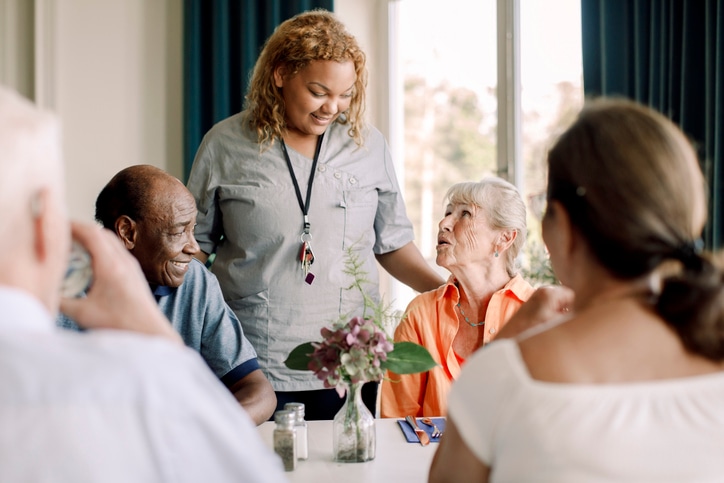In this article
When deciding between assisted living vs. skilled nursing, there are a number of factors to consider: how much support is needed, and for how long, being among the most important.
“Assisted living is perfectly suited for those who require some help with daily tasks, such as bathing, dressing or managing medications, while still enjoying a sense of independence,” notes Princella Seymour, founder and CEO of Complete Elder Solutions. “On the other hand, skilled nursing facilities are designed for individuals who need more comprehensive medical care and constant supervision, often due to chronic health conditions or post-surgical recovery.”
From the amenities and services offered to price differences, here’s everything you need to know about assisted living vs. skilled nursing.
Key takeaways
- Assisted living is best for those who need help with daily tasks but can still live independently, while skilled nursing provides 24/7 medical care for more complex health needs.
- Skilled nursing is usually short-term and medically focused, whereas assisted living is a long-term, lifestyle-oriented option.
- Skilled nursing is more expensive, while assisted living offers more social amenities at a lower cost.
Assisted living vs. skilled nursing: The key difference
Assisted living and skilled nursing cater to different needs, notes Emmanuel Cineus, a registered nurse and vice president of nursing at Constructive Partnerships Unlimited, an advocacy and support organization for individuals with intellectual and physical disabilities.
“Assisted living facilities are designed for individuals who can maintain some independence but require assistance with activities of daily living (ADLs),” he explains, noting that services may include help with bathing, cooking, housekeeping, laundry and transportation. “Assisted living allows seniors to live more independently.”
On the other hand, skilled nursing, which may take place in a nursing home, rehab center, hospital or at home even, provides a higher level of medical care and is often temporary. “Skilled nursing accommodates folks with complex medical needs and offers skilled nursing tasks,” he continues. (“Skilled nursing” is often used interchangeably with “nursing home,” but the former focuses on more short term care than the latter.)
It’s also important to note that, like assisted living, skilled nursing is not exclusively for older adults. It can provide support for any adult in need of “comprehensive medical care and constant supervision, often due to a health condition or post-surgical recovery,” Seymour notes.
Care and support provided in assisted living vs. skilled nursing
In addition to skilled nursing support being more short-term than what’s offered at assisted living, here are some of the key care differences, per Seymour and Cineus:
Skilled nursing support
Skilled nursing, whether it be at a skilled nursing facility or in-home, provides “intensive medical care,” according to Burton, which may include:
- 24-hour supervision.
- Wound cleaning and treatment.
- IV/catheter therapy.
- Medication management.
- Vital sign monitoring.
- Physical therapy.
- Occupational therapy.
- Speech therapy.
- End of life care.
Assisted living support
In general, assisted living doesn’t focus on medical support, Cineus notes, but instead “are a long-term care option for older adults who may need some assistance with ADLs and transportation.”
Many assisted living communities include support with:
- Bathing.
- Dressing.
- Hygiene.
- Eating and meal prep.
- Transportation to medical appointments.
- Medication management.
“Families should carefully assess the specific medical and personal needs. Consider current health status, the level of assistance required and the type of environment where you or they will feel most at home.”
— Princella Seymour, elder care solutions expert
Assisted living vs. skilled nursing: Services and amenities
Depending on where the skilled nursing is taking place, there may be some overlap of amenities and services, but in general, skilled nursing offers much less than assisted living in terms of amenities, note Burton and Cinues.
Skilled nursing facility amenities
If skilled nursing is being provided in a facility such as a nursing home, folks may be able to enjoy things like:
- Crafts and games.
- Movies.
- Nutritional support.
- Social work services.
- Meal preparation.
Assisted living amenities
More amenities are available at assisted living facilities, as the main goal is socialization and community. Here’s what folks can expert from an assisted living community:
- Meal preparation.
- Day-to-day housekeeping duties and chores.
- Group outings.
- Group fitness classes.
- Movie and game nights.
- Religious services.
- Gardening.
- Coffee meetups.
- Transportation to shopping or other non-medical outings.
Living accommodations in assisted living vs. skilled nursing
Assisted living communities are more long-term than skilled nursing, so, generally-speaking, the accommodations can feel more homey and personal, according to Seymour and Cinues. A few key differences:
Skilled nursing living accommodations
- Private or shared room.
- En-suite bathroom.
- Hospital-style beds.
- Emergency call buttons.
- Common area for dining or group activities.
Assisted living accommodations
- Private or semi-private apartment.
- Kitchen or kitchenette.
- Private bathroom.
- Emergency call buttons.
- Common area for dining or group activities.
Cost differences
The cost of skilled nursing can be “extensively higher than assisted living, due to the extensive care provided,” notes Cineus. That being said, a number of factors can influence both assisted living and skilled nursing, based on location, support needs, amenities and more.
Assisted living cost
According to Genworth and CareScout, the national median cost of care for assisted living in the United States is $5,900 per month.
Read more:
How to pay for assisted living
Skilled nursing cost
Skilled nursing often takes place at a nursing home, which, according to Genworth and CareScout, costs, on average $9,277 a month for a semi-private room and $10,646 for a private room. (Genworth, it should be noted, includes “skilled nursing facilities” under their nursing home umbrella.)
Medicare can cover some of the cost of skilled nursing; however, coverage is for a limited period of time.
Read more:
7 practical ways to pay for long-term care
How to determine the best fit
Assisted living vs. skilled nursing — which is the best fit for your or a loved one? Ultimately, Seymour notes, it comes down to the support needed.
“Families should carefully assess the specific medical and personal needs,” she notes. “Consider current health status, the level of assistance required and the type of environment where you or they will feel most at home.”
It’s also important to be realistic about how much support you or other family members can provide if you’re helping a loved one make the decision, Seymour continues. “And equally important to involve older loved ones in these conversations,” she says. “Their comfort and preferences are key to ensuring they feel secure and comfortable in their new environment.”
While every situation has its own unique set of circumstances and variables, ultimately, assisted living is for folks who need some help with everyday tasks, but can mostly live independently on their own. “Skilled nursing offers a higher level of daily physical care, security and supervision,” Cineus notes, adding that, in general, skilled nursing is short-term.
Whichever path you choose, both he and Seymour recommend doing your research, touring facilities and coming up with a list of questions to ask before making a commitment.





